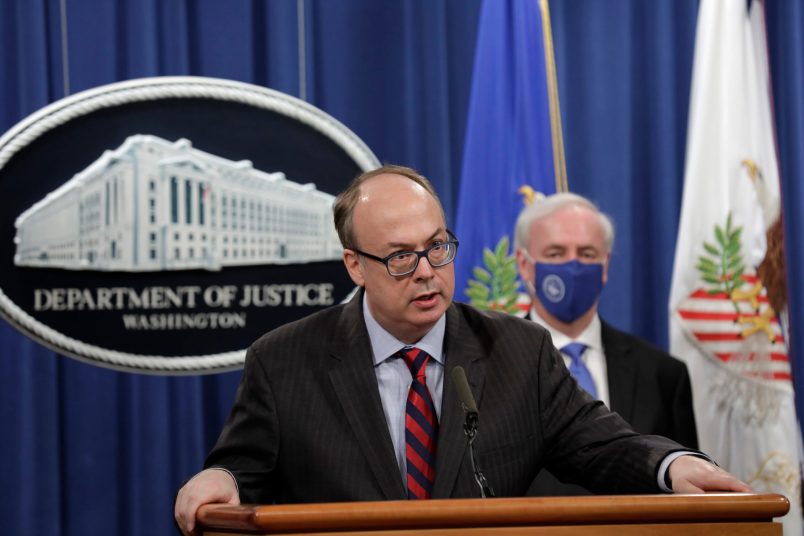Jeffrey Clark, a former high-ranking Trump-era Justice Department official, has indicated he’ll invoke the Fifth Amendment in refusing to provide testimony to the Jan. 6 Committee — a significant move from a key behind-the-scenes player in Trump’s efforts to steal a second term.
As the committee pursues a contempt of Congress criminal referral for Clark, they’ve left him one last chance to testify during a deposition scheduled for Saturday. They’ll pursue the contempt referral, Chairman Bennie Thompson (D-MS) said Thursday, “if Mr. Clark remains in defiance of the Select Committee’s subpoena.”
Clark’s raising his Fifth Amendment protections against self-incrimination is a revealing strategy for the former acting attorney general for the Justice Department’s Civil Division, observers told TPM.
Everyone subpoenaed by Congress has the right to plead the Fifth, they said. But for someone of Clark’s stature — and given his role in the Trumpian conspiracy to overturn the election — the move shows just how far he’s is willing to go to avoid answering questions.
“It marks an important inflection point in our evolving understanding of the role of former President Trump and his key enablers in the events leading up to and including the Jan. 6 insurrection and its aftermath,” said Norm Eisen, who served as special counsel to the House Judiciary Committing during Trump’s 2020 impeachment trial.
“That is not to say that we have to simply accept Mr. Clark’s latest in his ever-evolving series of efforts to dodge cooperating with the committee’s investigation,” Eisen said. “We don’t.”
In the pantheon of Trump allies intimately involved in his efforts to overturn the election results, Clark ranks near the top.
According to public reporting and a Senate Judiciary Committee report, in the days before the Jan. 6 attack, Clark pressured other Justice Department officials to have the department publicly announce that it was investigating election fraud — even though there was nothing of substance to investigate.
He also pushed to have the department send letters to legislators in Georgia and elsewhere suggesting they delay the certification of their Electoral College votes. Facing resistance from other high-ranking DOJ officials, Clark schemed with Trump about being elevated to lead the entire department — until they faced the threat of mass resignations.
Clark has appeared before the Jan. 6 committee before. In November, after being subpoenaed for documents and testimony by the committee regarding his efforts to have the Justice Department sow doubt about the 2020 election results, Clark stonewalled.
“At his deposition, he wouldn’t answer questions, he bickered with our members and counsel, and then he got up and left,” Committee Chair Thompson told the House Rules Committee Thursday, seeking a contempt of Congress referral for Clark.
At that time, Clark claimed his communications with Trump and others were privileged, a position the committee rejected. The shift to a Fifth Amendment strategy is telling.
“This is not some Joe Schmoe who is dragged in front of Congress who doesn’t know what’s going on,” said Alan Rozenshtein, a former attorney-advisor in the Justice Department’s National Security Division, and now a professor at the University of Minnesota.
“This is the former head of the Civil Division of the Department of Justice who — based on public reporting that I don’t think is really that much in question — conspired to undermine the electoral process of the United States,” Rozenshtein said. “In this situation, I do think we can afford to expect a little more from Jeffrey Clark.”
The committee, while simultaneously pursuing a contempt charge against Clark, still seems eager for another chance to sit him down.
“We will depose Mr. Clark on Saturday. And at that point, we will know exactly what testimony Clark believes may incriminate him,” Vice Chair Liz Cheney (R-WY) said Wednesday.
Importantly, the Fifth Amendment strategy may not be able to shield all of what Clark wants to keep from the committee. Eisen noted that there are tighter Fifth Amendment protections when it comes to document production, as opposed to simply testimony. He used the example of an alleged currency counterfeiter — for whom handing over a counterfeit bill could itself be incriminating.
“The Fifth Amendment has a much more limited application, the Supreme Court has held, when it comes to producing documents,” Eisen said.
“If he fails to produce documents that are not protected by the Fifth, if he plays games there, then that’s grounds for contempt as well.”


 Members-Only Article
Members-Only Article
